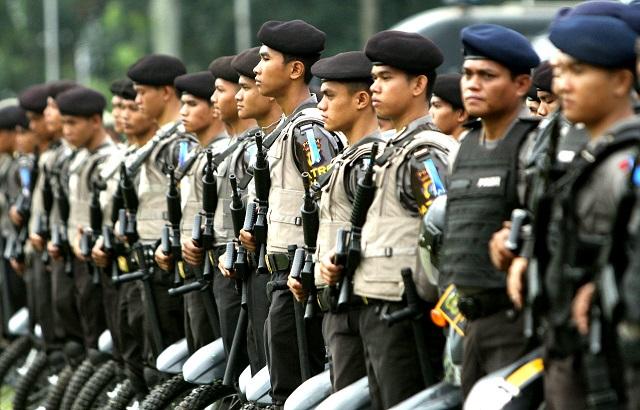Indonesian jihadism: increased intensity but familiar strategy
Posted By Cameron Sumpter on June 6, 2017 @ 14:30

The deadly attack on police outside a bus terminal in the Jakarta neighbourhood of Kampung Melayu last month was carried out by ‘fighters of the Islamic State’, according to the Amaq News Agency [1]. Three police officers died in the double bombing, which also killed the two assailants and injured 11 people, including five police. When asked about Islamic State involvement the following day, Indonesian National Police spokesman Awi Setyono said [2]: ‘There’s a link, but we’re still studying whether it’s an international network’.
Militants supporting the Islamic State have been responsible for an upturn in the frequency of attacks in Indonesia since early 2016, but there’s little evidence that the Syria-based organisation’s influence has changed the tactics and targets of Indonesian jihadis.
Following the first Bali bombing in 2002, a Jemaah Islamiyah splinter network [3], led by a Malaysian national Noordin Mohammed Top, conducted four large-scale bomb attacks between 2003 and 2009. Targets included upscale hotels, the Australian Embassy in Jakarta and a busy tourist area of Kuta, Bali. Yet the campaign divided opinion among the Indonesian jihadist movement; many believed [4] the indiscriminate assaults were counterproductive as they achieved little, and provoked a sustained police crackdown and widespread public condemnation.
Noordin was finally cornered in late 2009, and died during a shootout [5] with police. A few months later, police eliminated a jihadi training camp in Aceh [6] which had been established to unite various factions and to refocus attention on targeting the Indonesian state, instead of the symbolic al-Qaeda-style attacks preferred by Noordin and his followers.
By the end of 2010, Indonesian police—particularly the effective counterterrorism unit Detachment 88—had either killed or arrested and prosecuted several hundred terror suspects since the first Bali attack, including much of the senior leadership. Remnant militants decided the best future approach was to operate within small independent cells [7] and stage more narrowly-focused assaults. Given their success at dismantling the jihadi networks, police officers became the number one target.
The first attack came in April 2011, when a suicide bomber detonated his device [8] during Friday prayers at a mosque inside a police compound in the West Java city of Cirebon. The only fatality was the assailant, but the bomb injured 28 people, mostly police officers. Later that year in Central Sulawesi, Santoso—who would go on to establish Mujahidin Indonesia Timur (MIT)—began targeting police [9] in Poso and Palu. His group killed and injured several officers in drive-by shootings and ambush attacks over the next few years.
The Islamic State’s declaration of a caliphate in 2014 resulted in a number of high (and low) profile Indonesian jihadis pledging allegiance to the organisation’s leader, Abu Bakr al-Baghdadi. The first attack staged by those IS adherents wasn’t until January 2016, however, when a police post and adjacent Starbucks café in central Jakarta were attacked [10] with crude bombs, and gunmen opened fire on police at the scene. The operation was the first involving a symbol of the West since the 2009 Ritz Carlton bombing, but police were clearly targeted in equal measure. Six months later, a lone suicide bomber blew himself up [11] outside a police station in the Central Java city of Solo, injuring one officer. And in November, a young man linked to Indonesia’s most notorious ideologue, Aman Abdurrahman, injured three police officers [12] in greater Jakarta by slashing and stabbing them with a knife.
Botched IS-linked operations over the past year have targeted two churches and a local government office in Bandung, while an ambitious plot [13] to attack guards outside the presidential palace, which would have involved Indonesia’s first female suicide bomber, was thwarted in December 2016.
The perpetrators of the double bombing in Kampung Melayu last month may well have had links to the Islamic State, but their target and tactics appear to be a continuation of domestic strategy dating from the beginning of the decade. The bombing of the Starbucks café in January last year suggested that foreigners may once again be a focus of attacks, but the attempted and staged operations since have provided no further evidence of that development.
While the strategy of Indonesian jihadis doesn’t appear to have changed substantially since the caliphate was declared in 2014, the Islamic State has had an influence on the Indonesian networks in two important ways. First, it has re-energised the jihadist movement and inspired more would-be militants to act, resulting in an increased frequency of attacks. Second, the organisation’s global brand has ensured that an Indonesian operation with ‘links to ISIS [14]’ will receive far greater international media exposure than previous attacks generated.
Through prominent barbarity, the Islamic State has thrust the threat of terrorism back onto the world stage in recent years. The organisation’s notoriety has become truly global, but its impact on pre-existing militant networks shouldn’t be overstated. Indonesia’s jihadi movement has a long history, a complex internal dynamic and its own domestic agenda.
Article printed from The Strategist: https://aspistrategist.ru
URL to article: /indonesian-jihadism-increased-intensity-familiar-strategy/
URLs in this post:
[1] Amaq News Agency: https://news.siteintelgroup.com/Jihadist-News/is-amaq-reports-jakarta-attack-carried-out-by-is-fighter.html
[2] said: http://www.channelnewsasia.com/news/asiapacific/indonesian-president-urges-calm-after-islamic-state-linked-jakarta-attacks-8882484
[3] splinter network: https://www.crisisgroup.org/asia/south-east-asia/indonesia/indonesia-noordin-top-s-support-base
[4] many believed: https://www.crisisgroup.org/asia/south-east-asia/indonesia/indonesia-hotel-bombings
[5] died during a shootout: http://www.nytimes.com/2009/09/18/world/asia/18indo.html
[6] jihadi training camp in Aceh: https://www.crisisgroup.org/asia/south-east-asia/indonesia/indonesia-jihadi-surprise-aceh
[7] operate within small independent cells: https://www.crisisgroup.org/asia/south-east-asia/indonesia/indonesian-jihadism-small-groups-big-plans
[8] detonated his device: http://www.bbc.com/news/world-asia-pacific-13090306
[9] began targeting police: http://www.understandingconflict.org/en/conflict/read/21/Weak-Therefore-Violent-The-Mujahidin-of-Western-Indonesia
[10] attacked: https://www.nytimes.com/2016/01/15/world/asia/jakarta-explosion.html?_r=0
[11] blew himself up: http://www.reuters.com/article/us-indonesia-security-idUSKCN0ZL039
[12] injured three police officers: http://www.thejakartapost.com/news/2016/10/20/three-policemen-injured-in-tangerang-knife-attack.html
[13] ambitious plot: http://time.com/4689714/indonesia-isis-terrorism-jihad-extremism-dian-yulia-novi-fpi/
[14] links to ISIS: http://www.straitstimes.com/asia/se-asia/jakarta-suicide-bombers-may-have-links-to-isis
Click here to print.